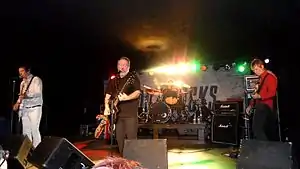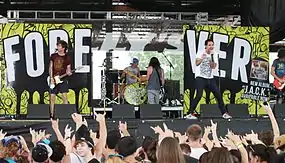Pop-punk
Pop-punk (also known as punk-pop) is a rock music genre that combines the textures and fast tempos of punk rock with the melodies and chord progressions of power pop.[1] It is defined for its emphasis on traditional pop songcraft and adolescent and anti-suburbia themes,[2] and is distinguished from other punk-variant genres by drawing more heavily from 1960s pop rock and the music of bands such as the Beatles, the Kinks, and the Beach Boys.
| Pop punk | |
|---|---|
| Other names | Punk pop |
| Stylistic origins | |
| Cultural origins | Late 1970s, United States and United Kingdom |
| Derivative forms | Emo rap |
| Subgenres | |
| Neon pop punk | |
| Fusion genres | |
| Other topics | |
| Skate punk | |
Pop-punk has evolved throughout its history, absorbing elements from new wave, college rock, ska, rap, emo, and boy bands, and is sometimes viewed interchangeably with power pop and skate punk. The genre emerged in the late 1970s with groups such as the Ramones, the Undertones, Buzzcocks, Bad Religion, and the Descendents, followed in the 1980s and early 1990s by a host of bands signed to Lookout! Records, including Screeching Weasel, the Queers, and the Mr. T Experience. In the mid-to-late 1990s, pop-punk reached widespread popularity with bands like Green Day, the Offspring and Blink-182. The genre was further popularized by the Warped Tour.
After the 2000s, pop-punk acts were largely indistinguishable from artists tagged as "emo", to the extent that emo crossover acts such as Fall Out Boy and Paramore popularized a punk-pop style dubbed emo pop. By the 2010s, pop-punk's mainstream popularity had waned, with rock bands and guitar-centric music becoming rare on dance-focused pop radio. In 2020, pop-punk began experiencing a resurgence.
Definition and characteristics
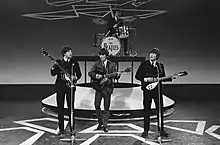
Punk-pop is variously described as a punk subgenre[3][4] a variation of punk,[5][6][7] a form of pop music,[8] and a genre antithetical to punk in a similar manner as post-punk.[7] It has evolved stylistically throughout its history, absorbing elements from new wave, college rock, ska, rap, emo, and boy bands.[6] Writers at The A.V. Club described pop-punk as a punk subgenre that has "essentially been around as long as punk itself" with roots in the "classic pop of The Beatles, The Kinks, and The Beach Boys, often pitting sweet harmonies against bratty, rowdy riffs."[3] According to Ryan Cooper of About.com, "pop punk is a style that owes more to The Beatles and '60s pop rock than other sub-genres of punk".[4]
There is considerable overlap between power pop and pop punk, and the two styles are often conflated.[3] Web publication Revolver acknowledged that while pop punk and power pop are often presented interchangeably, "the core concept is simple — melodic songs packaged with a punk slant."[9] In Brian Cogan's The Encyclopedia of Punk Music and Culture (2006) pop-punk is characterized as "a catchy, faster version of power pop."[10] AllMusic defines "pop punk" as "a post-grunge strand of alternative rock" that combines the textures and fast tempos of punk rock with the "melodies and chord changes" of power pop.[1] In the 1990s, there was overlap between pop-punk and skate punk.[11] Music journalist Ben Myers wrote that the two terms were synonymous.[12]
Rock writer Greg Shaw, who wrote extensively about power pop and took credit for codifying the genre in the 1970s, originally defined power pop itself as a hybrid style of punk and pop.[13] Green Day frontman Billie Joe Armstrong, who described power pop as "the greatest music on Earth that no one likes",[14] opined that the "pop-punk" term was an oxymoron: "You're either punk or you're not."[6] Writing in Shake Some Action: The Ultimate Guide to Power Pop (2007), actor Robbie Rist felt that much of the genre merely consisted of pop bands who "add the 'punk' moniker so the kids will think they are pissing off their parents."[8]
—Vice writer Jason Heller[7]
Rolling Stone, in an article about pop punk, wrote that the term was a retroactive label for punk bands who had "always championed great songwriting alongside their anti-authoritarian stance. And punk's focus on speed, concision and three-chord simplicity is a natural fit with pop's core values."[6] Vice's Jason Heller described "an open respect for the tradition and craft of pop songwriting" as a key characteristic of pop punk.[7] Bill Lamb, also from About.com, writes that "punk-pop" is a variant of punk music that features "a hard and fast guitar and drums base but powered by pop melodies like much of 70's punk rock."[15] Alter the Press! defines pop punk as "a genre that originates from mixing punk rock with pop sensibility".[5]
Lyrically, pop punk often addresses adolescent themes of lust, drugs, and rebellion.[3] Some pop punk lyrics focus on jokes and humor.[3] The New Yorker's Amanda Petrush summarized that the "rawness" of punk-pop "lies not in the music" but by conveying the "spectrum of human experience, all that longing and self-doubt."[6]
History
Formative acts (1970s–1980s)
Punk rock has always shared sensibilities with pop music, especially since the late 1970s.[12] In his book Rock and Roll: A Social History (2018), author Paul Friedlander lists the following English artists as representative of the "new wave of pop-punk synthesis" that occurred in the late 1970s: Elvis Costello and the Attractions, the Police, the Jam, Billy Idol, Joe Jackson, the Pretenders, UB40, Madness, the Specials, the English Beat. Likewise, among American acts, Friedlander references Talking Heads, Blondie, the B-52s, the Motels, and Pere Ubu.[17]
Heller said that the Ramones crafted a blueprint for pop-punk with their 1976 debut album, but 1978 was the year that the genre "came into its own".[7] He noted that some bands "were unmistakably pop-punk bands by today's definition of the term, but in 1978, the distinction wasn't so clear. Plenty of punk groups of the era threw a token pop tune or two into their set—sometimes for ironic effect, other times earnestly."[7] Heller also acknowledged that many "burgeoning pop-punk groups in 1978 bordered on power-pop, a parallel genre on the rise at the time. But power-pop began earlier, and it was a more American phenomenon".[7]
Among the influential pop-punk bands of the late 1970s were Buzzcocks.[7] An LA Weekly writer later referred to the band's 1979 compilation album Singles Going Steady as "the blueprint for punk rock bands preferring tuneful tales of lost love and longing to rage against the machine."[18] Cooper similarly cited the album as one of punk's most influential and added that Buzzcocks' "pop overtones [led] them to be a primary influence on today's pop-punk bands.".[19] Heller referred to the Undertones as "the most subversive band" of the genre during this period, particularly their 1978 single "Teenage Kicks", "one of the most striking and definitive pop-punk classics."[7]
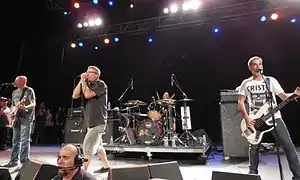
Bad Religion, formed in 1979, helped to lay the groundwork for the pop punk style that emerged in the 1990s.[12] They and some of the other leading bands in Southern California's hardcore punk scene emphasized a more melodic approach than was typical of their peers. According to Myers, Bad Religion "layered their pissed off, politicized sound with the smoothest of harmonies". Myers added that another band, the Descendents, "wrote almost surfy, Beach Boys-inspired songs about girls and food and being young(ish)".[12] Their positive yet sarcastic approach began to separate them from the more serious hardcore scene. The Descendents' 1982 debut LP Milo Goes to College provided the template for the United States' take on the more melodic strains of first wave punk.[18]
Mainstream breakthrough (1990s)
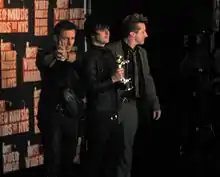
During the 1980s and early 1990s, pop punk bands such as Green Day, the Queers, The Mr. T Experience and Screeching Weasel emerged from the record label Lookout! Records with a sound indebted to Buzzcocks and the Undertones.[7] In August 1992, early 1990s California punk rock and pop punk was noticed by the magazine Spin when the magazine published a story called "California Screamin' ", which is about the early 1990s underground punk rock scene in California, mentioning pop punk bands like Screeching Weasel and Green Day.[20]
In 1993, California's Green Day and Bad Religion were both signed to major labels, and by 1994, pop punk was quickly growing in mainstream popularity. Many punk rock and pop punk bands originated from the California punk scene of the late 1980s, and several of those bands, especially Green Day and the Offspring, helped revive interest in punk rock in the 1990s.[21] Green Day arose from the 924 Gilman Street punk scene in Berkeley, California.[22] After building an underground following, the band signed to Reprise Records and released their major-label debut album, Dookie, in 1994. Dookie sold four million copies by the year's end and spawned several radio singles that received extensive MTV rotation, three of which peaked at number one on the Modern Rock Tracks chart.[23] Green Day's enormous commercial success paved the way for other North American pop punk bands in the following decade.[24]
MTV and radio stations such as Los Angeles' KROQ-FM played a major role in the genre's mainstream success.[25] The Warped Tour brought punk even further into the United States mainstream.[26] With punk rock's renewed visibility came concerns among some in the punk subculture that the music was being co-opted by the mainstream.[25] Some punk rock fans criticized Green Day for "selling out" and rejected their music as too soft, pop-oriented and not legitimate punk rock.[23][27][28] They argued that by signing to major labels and appearing on MTV, bands like Green Day were buying into a system that punk was created to challenge.[29]
Second wave (1990s–2000s)
In the late 1990s and early 2000s, pop punk band Blink-182 achieved mainstream success with Enema of the State (June 1999). In the description of journalist Matt Crane, the record initiated "a new wave of pop punk". He added, "At any given time in the late ’90s/early 2000s, it was not uncommon to see Blink-182 and Sum 41 on MTV. You couldn't escape it. Pop-punk was in, and it became the undisputed mainstream choice."[16] Lamb described second-wave pop punk bands, led by Blink-182, as having "a radio friendly sheen to their music, but still maintaining much of the speed and attitude of classic punk rock".[15] Saves the Day's Through Being Cool (November 1999) also paved the way for the new wave of pop punk, influencing bands such as Fall Out Boy, My Chemical Romance and Taking Back Sunday.[30]
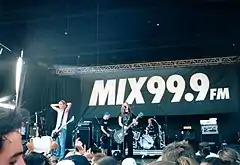
Although fans of the genre usually dispute her role in the movement, Avril Lavigne's 2002 album Let Go set a precedent for the success of female-fronted punk-pop acts. Journalist Nick Laugher wrote that it was "undeniable" that the record launched pop-punk into the mainstream, "blurring the lines with it and straight-up pop music, and making it more of a cultural movement than a genre. ... but a lot of 'pop punk purists' argue that it's not really a pop punk album. ... When this album came out, it got a lot of flak, and it all seems rather like nonsense as the years go by."[31] Lavigne has been occasionally described as the genre's "queen".[32][33] For her part, Lavigne preferred to describe her music as "pop rock", rather than punk.[34][35]
According to Brooklyn Vegan's Andrew Sacher, after the success of "hugely popular" 2000s bands such as Fall Out Boy, Paramore, and My Chemical Romance, "the line between pop punk and emo look[ed] close to nonexistent."[36] Several pop-punk bands took different directions in the late 2000s, with Panic! at the Disco crafting the Beatles-inspired, baroque-styled record Pretty. Odd. (2008) and Fall Out Boy experimenting with glam rock, blues rock and R&B on Folie a Deux (2008), both of which created fan confusion and backlash. Folie a Deux sold worse than their preceding albums, a representation of the backlash from their fanbase as the group experimented with a musical style differing from their pop punk background.[37][38]
Decline in mainstream popularity and continued interest (2010s)
Pop punk lost its mainstream popularity in the early 2010s, with rock bands and guitars becoming rare on dance-focused pop radio.[39] Some acts, such as New Found Glory, have seen concert attendance numbers decrease steadily.[40] Devon Maloney of MTV wrote that "Pop punk and emo bands don't headline Coachella or Bonnaroo; they rarely, if ever, are even billed on mainstream festival stages," and notes that it has similarly disappeared from the press. The only magazines that feature pop punk bands are niche publications like Alternative Press and the occasional teen magazine, while influential pop punk magazine AMP ceased publication in 2013.[41] The decline in mainstream popularity for the genre, coupled with the closure of many mid-size venues associated with it, has resulted in many venues and labels returning to the DIY ethic that first spawned the punk movement.[42][43]
By 2012, pop punk bands that had achieved minimal mainstream success had seen a return to grassroots form, "the micro-operation style that yielded the results that caught the mainstream's attention in the first place."[41] Chad Gilbert of New Found Glory wrote in an op-ed for Alternative Press entitled "Why Pop-Punk's Not Dead—And Why It Still Matters Today": "This isn't a dead genre, and just because there isn't a song on the radio to clarify that shouldn't matter. ... Pop-punk means something to a lot of people and to me, having success as a band in our genre is about longevity, touring a lot and staying true to your fans."[40]
– Kelen Capener of The Story So Far, 2012
Many pop punk bands have folded; "once essentially child stars, their members are now adult musicians hoping to move beyond the teen trappings that gave them careers."[41] Fall Out Boy and Paramore, two groups that achieved mainstream success within the genre, had two number one albums—Save Rock and Roll and Paramore—side by side on the Billboard 200. Fall Out Boy along with other pop punk bands that peaked during the mid-2000s are now seen to be experimenting with the more pop side of the pop punk, in order to maintain their relevancy and keep the interest of their fanbase while gaining the appeal of the newer generations that may not relate as much to the punk themes of the 1970s.[45] Their popularity provoked conversations about the state of the genre; Maloney opined that these records could not be viewed as pop punk.[41]
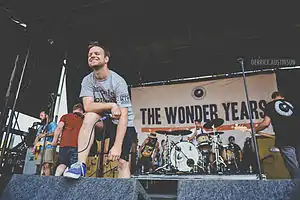
Between the late 2000s and early 2010s, a new wave of pop punk groups emerged.[46] Dave Beech of Clash noted that these groups were "[d]arker and more mature" than those previously, taking influence "and occasional indifference" from 1990s emo.[46] On The Wonder Years' The Upsides (2010), vocalist Dan Campbell sung about "His early twenties soul-searching and tales of strife" which "resonated with a [new] generation, inspiring countless imitators in the process."[47] This pushed Campbell to "the forefront of a new wave", and the album influencing a new wave of pop punk bands.[47] Rock Sound included The Wonder Years' The Greatest Generation on their best albums of 2013 list, calling it "the defining album of what may well have been the genre's best year for a decade."[48] Kerrang! said the album "ripped up the pop-punk blueprint" pushing the genre to "new peaks of invention, both lyrically and musically."[49] The Story So Far's What You Don't See (2013) "cemented their place at the top table of nu pop-punk".[50]
As of 2013, the genre had experienced a resurgence.[51] Several pop punk bands have embarked on anniversary tours, playing some of their most popular albums in full. While some members of these bands have had mixed feelings about these performances, quite often these tours sell as well as or better than the first time around.[41] Club promoters in the UK have created nights based around lasting appreciation of the genre.[52] The Warped Tour still attracts hundreds of thousands of attendees each year; the 2012 tour attracted 556,000 festival-goers, its third-best attendance.[41] Bobby Olivier of The Star-Ledger wrote: "The genre ... continues to reinvent itself and Warped is pop-punk's prom."[53]
In early 2014, Welsh band Neck Deep released their debut album Wishful Thinking, which Rock Sound later called it "the greatest UK pop-punk record of all time."[54] Also in 2014, Australian band 5 Seconds of Summer's self titled album debuted at number 1 on the Billboard 200 chart and in many other countries, prompting Alternative Press to describe the band as important to the marketing of the pop-punk scene.[55]
In 2016, Rolling Stone reported that pop-punk was "still one of the most predominant and popular rock genres". The magazine conducted a reader's poll for the "10 Best Pop-Punk Albums of All Time" that ultimately included Green Day (Dookie, American Idiot, Nimrod, ), Blink-182 (Enema of the State, Take Off Your Pants and Jacket, Dude Ranch), the Ramones (The Ramones), the Offspring (Smash), Jimmy Eat World (Bleed American), and Generation X (Valley of the Dolls).[56]
In the late-2010s, the genre was influential on the development of emo rap. Many emo rappers gained mainstream attention during this period. In particular, Lil Peep, Lil Uzi Vert, Juice WRLD and XXXTentacion were all vocal about their love for and influence from pop punk. This brought about a revived interest in the genre in popular culture.[57][58]
In 2019, Machine Gun Kelly, who had been established as a rapper for over a decade, released the pop punk song I Think I'm Okay featuring Yungblud and Travis Barker. His first release in the genre, the song was nominated at the 2019 Billboard Music Awards[59] and was certified platinum within a year.[60]
Resurgence (2020s-present)
_03.jpg.webp)
In 2020, Machine Gun Kelly released his fifth studio album Tickets To My Downfall, his first entirely pop punk album. The album debuted at number 1 on the Billboard 200 chart, becoming the first rock album to top this chart since Tool's Fear Inoculum in September 2019.[61] The Evening Standard credited the album as "bridg[ing] the gap" between the modern pop punk scene and the mainstream interest that developed from the emo rap scene.[59] My Ex's Best Friend, a song from Tickets to My Downfall, has since peaked at number 28 on Billboard Hot 100. Because of this, a number of media outlets began crediting him with leading a pop punk revival.[62][63][64] An article by Kerrang! credited Machine Gun Kelly as well as Yungblud as bringing the genre back to mainstream attention. In addition to this, the publication cited the app TikTok as one of the key factors, as videos tagged #poppunk had received 400 million views by January 21st 2021. On the app, viral trends took place using tracks from pop punk bands like All Time Low, Simple Plan and Paramore.[65] Additionally In August 2020, producers Travis Mills and Nick Gross launched their pop punk band Girlfriends.[66] Spin writer Al Shipley described pop punk and it's new association with hip hop as 2020's "commercial juggernaut".[67]
In 2021, Monsters by All Time Low featuring Blackbear and Demi Lovato debuted on Billboard Hot 100 at number 88 and has since peaked at number 70. On January 8, 2021, Mod Sun and Avril Lavigne released the pop punk song Flames,[68] which charted in the top 100 in New Zealand,[69] Canada[70] and the United Kingdom.[71] During this period a number of other mainstream acts began experimenting with the genre such as Maggie Lindemann,[72] KennyHoopla[73] and Lil Huddy,[74] Hip hop musicians who also began incorporating further pop punk influences into their sound during this time, include Iann Dior,[75] 24kGoldn and Powfu.[76]
Offshoots and subgenres
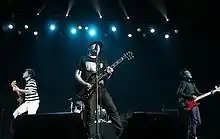
Emo pop
Emo pop (or emo pop punk) is a subgenre of both emo and pop punk.[77] It became popular in the mid-2000s, with record labels such as Fueled by Ramen releasing platinum albums from bands including Fall Out Boy, Panic! at the Disco, Red Jumpsuit Apparatus and Paramore.[78] Maloney wrote: "While many pop punk fans adamantly deny any association between their favorite acts and those labeled "emo," crossover bands who melded the two have gradually put both genres in the same scene-boat."[41]
Easycore
Easycore (less commonly known as popcore, dudecore, softcore, happy hardcore, and EZ)[79] is characterized by its use of melodies commonly found in pop punk fused with breakdowns found in post-hardcore and hardcore punk.[80] A number of groups also take influence from metal and make use of unclean vocals.[81] The genre's roots come from early 2000s pop punk with New Found Glory being highly influential in its development, and naming the genre on a tour known as the "Easycore tour".[79] The easycore sound later emerged in the mid-to-late 2000s and early 2010s through bands such as A Day to Remember and Four Year Strong.[79]
Neon pop-punk
Neon pop-punk is a form of pop-punk that emphasizes synthesizers.[82] Alternative Press writer Tyler Sharp wrote that while this wasn't the first instance that "a band decided to put fuzzy keys over their chord progressions, but it was a time when that formula was perfected."[82] Kika Chatterjee of Alternative Press added that the late 2000s "brought in glowing synths and poppy melodies that shifted the entire definition of [pop punk]", giving it the "neon" moniker.[83] Sharp cited Forever the Sickest Kids' debut album Underdog Alma Mater (2008) as "a big moment" for the genre.[84]
Criticism
Pop punk, particularly mainstream pop punk, has been widely criticized by punk rocks pop-music influences and mainstream popularity.[85][86][87] Many mainstream pop punk bands have been considered "sellouts" and "posers" by punk fans.
Green Day were accused of selling out since the release of Dookie for signing to a major label and becoming mainstream.[88] John Lydon of the 1970s punk band the Sex Pistols criticized Green Day and said that Green Day are not a punk band. Lydon said: "Don't try and tell me Green Day are punk. They're not, they're plonk and they're bandwagoning on something they didn't come up with themselves. I think they are phony."[89] Green Day guitarist and lead singer Billie Joe Armstrong said: "Sometimes I think we've become redundant because we're this big band now; we've made a lot of money—we're not punk rock anymore. But then I think about it and just say, 'You can take us out of a punk rock environment, but you can't take the punk rock out of us.'"[88]
Blink-182 also received a lot of criticism from punk rock fans, being accused of selling out for their pop-music-inspired style of pop punk. Lydon called Blink-182 "bunch of silly boys ... an imitation of a comedy act."[90] Former Blink-182 guitarist and singer Tom DeLonge responded to criticism, saying "I love all those criticisms, because fuck all those magazines! I hate with a passion Maximumrocknroll and all those zines that think they know what punk is supposed to be. I think it's so much more punk to piss people off than to conform to all those veganistic views."[91]
In a November 2004 interview, Sum 41 rhythm guitarist and lead singer Deryck Whibley said: "We don't even consider ourselves punk. We're just a rock band. We want to do something different. We want to do our own thing. That's how music has always been to us."[92] Sum 41's lead guitarist Dave Baksh reiterated Whibley's claims, stating "We just call ourselves rock... It's easier to say than punk, especially around all these fuckin' kids that think they know what punk is. Something that was based on not having any rules has probably one of the strictest fucking rule books in the world."[93]
See also
- List of pop punk albums
- List of pop punk bands
- Skate punk
References
- "Punk-Pop Music Genre Overview". AllMusic.
- Staff. "The 100 Best Pop Punk Bands". Consequence of Sound. Retrieved January 21, 2021.
- Anthony, David; Heller, Jason; Ryan, Kyle (March 6, 2014). "A beginner's guide to the bouncy buzz of pop-punk". The A.V. Club.
- Cooper, Ryan. "The Subgenres of Punk Rock". About.com. Retrieved March 4, 2017.
- "FEATURE: "WHAT POP PUNK MEANS TO ME"". Alter the Press!.
- "50 Greatest Pop-Punk Albums". Rolling Stone. November 15, 2017.
- Heller, Jason (February 26, 2018). "How 1978 Kicked Off the Explosion of Pop-Punk". Vice. Retrieved August 18, 2020.
- Borack 2007, p. viii.
- "50 GREATEST PUNK ALBUMS OF ALL TIME". Revolver. May 24, 2018.
- Cogan 2006, p. 86.
- "Skatepunk". AllMusic.
- Myers 2006, p. 52.
- Shaw, Greg (1994). "It was 20 years ago today ..." Bomp.com. Archived from the original on December 12, 2009. Retrieved December 4, 2009.
- Doyle, Patrick; Kobiella, Chris (January 29, 2020). "Billie Joe Armstrong: My Life in 15 Songs". Rolling Stone.
- Lamb, Bill. "Punk Pop". About.com (IAC). Archived from the original on April 15, 2012. Retrieved August 19, 2011.
- Crane, Matt (April 17, 2014). "The 5 great eras of pop-punk, from the '70s to today". Alternative Press.
- Friedlander, Paul (2018). Rock And Roll: A Social History. Taylor & Francis. p. 254. ISBN 978-0-429-96325-4.
- Nicholas Pell (July 9, 2013). "The 5 Best Pre-Dookie Pop-Punk Records". LA Weekly. Archived from the original on August 30, 2013. Retrieved September 12, 2013.
- Cooper, Ryan (2019). "Punk's Most Influential Albums". About.com.
- Fidler, Daniel (August 1992). "California Screamin'". Spin. Vol. 8 no. 5. SPIN Medic LLC. ISSN 0886-3032. Retrieved November 7, 2018.
- DeRogatis 2003, p. 357.
- Caramanica, Jon (September 25, 2012). "Pop-Punk Bands, Now Grown Up". The New York Times. New York City: The New York Times Company. ISSN 0362-4331.
- Strauss, Neil (February 5, 1995). "POP VIEW; Has Success Spoiled Green Day?". The New York Times. New York City. ISSN 0362-4331.
- D'Angelo, Joe, "How Green Day's Dookie Fertilized A Punk-Rock Revival", MTV.com, September 15, 2004. Retrieved on December 3, 2007.
- Gold, Jonathan (November 1994). "The Year Punk Broke". Spin. New York City: Spin Media. ISSN 0886-3032.
- Diehl 2007, pp. 2, 145, 227.
- "Sex Pistols' John Lydon Brands Green Day 'Punk Imitators' | Live4ever Ezine". Live4ever.uk.com. Retrieved 2013-02-26.
- "Green Day Fail To Impress Punk Icon". Contactmusic.com. Retrieved 2013-02-26.
- Myers 2006, p. 120.
- McGuire, Colin (November 3, 2014). "Saves The Day look back on 15 years of 'Through Being Cool'". Alternative Press. p. 1. Retrieved September 10, 2015.
- Laugher, Nick. "6 Canadian albums that changed pop punk forever". Aux TV. Archived from the original on 15 February 2017. Retrieved 16 March 2017.
- Gamble, Ione. "11 Times Kelly Osbourne's Early 2000 Outfits Were Our Pop Punk Inspiration – PHOTOS". Archived from the original on August 13, 2017. Retrieved April 15, 2017.
Whether owning the red carpet with then-bestie and reigning queen of pop-punk Avril Lavigne.
- Lindner, Emily. "Which 2004 Pop Punk Princess Are You?". Archived from the original on May 22, 2017. Retrieved May 15, 2017.
Where have all the pop punk girls gone? Sure, Avril Lavigne still reigns as queen ...
- Abou-Jaoude, Paula (November 16, 2007). "Uma Avril patricinha". Capricho Magazine (in Portuguese). Retrieved 13 October 2020.
I've been listening to a lot of punk rock, so you might notice a certain punk influence on my new record. I like aggressive music, but I like pop rock a lot, which is what I really know how to do.
- Copsey, Robert (October 14, 2013). "Avril Lavigne interview: 'I'll always be young at heart'". Digital Spy. Archived from the original on June 13, 2015.
For me, my music's always been heavy pop rock.
- Sacher, Andrew (2020). "15 '80s punk albums that shaped the '90s/'00s pop punk boom". Brooklyn Vegan.
- Perpetua, Matthew (February 29, 2012). "Patrick Stump: I'm a 27-Year-Old Has-Been". Rolling Stone. New York City. ISSN 0035-791X.
- Greene, Andy (March 18, 2011). "The 25 Boldest Career Moves in Rock History". Rolling Stone. No. 1127. New York City. ISSN 0035-791X.
- Fall Out Boy, Wiz Khalifa Announce Extensive 'Boys of Zummer' Tour Rolling Stone. Retrieved January 17, 2015.
- Chad Gilbert (September 29, 2011). "Why Pop-Punk's Not Dead—And Why It Still Matters Today". Alternative Press. Retrieved September 17, 2013.
- Devon Maloney (April 24, 2013). "What Happened to Emo?". MTV News. Retrieved September 17, 2013.
- Welsh, April (23 December 2015). "How DIY Culture Is Thriving In The U.K." Thefader.com. Retrieved 3 March 2018.
- "HENRY ROLLINS TALKS TRUMP, SNAKES AND DIY PUNK RESURGENCE". Soundsmagazine.co.uk. 16 December 2016. Retrieved 3 March 2018.
- Ed Cooper (November 14, 2012). "The Story So Far: Pop-punk is a zombie". The Independent. London. Archived from the original on November 2, 2013. Retrieved September 17, 2013.
- Mikael Wood (May 11, 2013). "Fall Out Boy and Paramore: Coming back on top". Los Angeles Times. Retrieved September 12, 2013.
- Beech, Dave (May 23, 2016). "Modern Baseball - Holy Ghost". Clash. Retrieved May 24, 2016.
- Bird 2015, p. 45.
- "The 50 Best Albums Of 2013 Part Five: 10 – 1 | Photos | Rock Sound". Rocksound.tv. December 6, 2013. Retrieved July 2, 2015.
- McMahon, James, ed. (September 13, 2014). "Pop-Punk's Not Bread". Kerrang!. London: Bauer Media Group (1534): 42. ISSN 0262-6624.
- Bird 2015, p. 73.
- Ian Cohen (August 2, 2013). "The Forgotten Pop-Punk Records of Summer". Grantland.com. Retrieved September 12, 2013.
- Sian Rowe (August 20, 2011). "Say It Ain't So! Club nights reanimate the pop-punk sound of Blink-182". The Guardian. Retrieved September 17, 2013.
- Bobby Olivier (July 15, 2013). "What Jersey sounds like: The power of pop-punk". The Star-Ledger. Retrieved September 17, 2013.
- Bird 2015, p. 66.
- Why 5 Seconds Of Summer are more important to pop-punk than you think Alternative Press. Retrieved January 2, 2015.
- Spanosdate=July 6, 2016, Brittany. "Readers' Poll: The 10 Best Pop-Punk Albums of All Time". Rolling Stone.
- Mench, Chris. "Misery Business: How Gen-Z Rappers Are Reinventing The Emo & Pop Punk Influences Of Their Childhood". Retrieved 5 February 2021.
- Eloise, Marianne. "From Lil Peep To Paramore, Emo And Rap Have Been Related For Years". Kerrang!. Retrieved 5 February 2021.
- FEIGIN, SARA. "How Machine Gun Kelly's latest album catapulted him to pop-punk fame". Evening Standard. Retrieved 5 February 2021.
- "GOLD & PLATINUM".
- "Machine Gun Kelly Earns First No. 1 Album on Billboard 200 Chart With 'Tickets to My Downfall'". Billboard. Retrieved 2020-12-13.
- Richardson, Jake. "Is pop-punk really dead?". Kerrang!. Retrieved 4 February 2021.
- Weiss, Jamie. "RAPPER MACHINE GUN KELLY IS THE MEN'S FASHION ICON WE NEED IN 2021". Retrieved 4 February 2021.
- WILLIAMS, AARON. "MGK Defends His New Album's Shift Away From Rap To Pop-Punk". Retrieved 4 February 2021.
- Bulmer, Eloise. "Why is pop-punk so big on TikTok?". Kerrang!. Retrieved 4 February 2021.
- Dowd, Rachael. "SEE TRAVIS MILLS RETURN TO MUSIC WITH HIS NEW POP-PUNK BAND GIRLFRIENDS". Alternative Press. Retrieved 5 February 2021.
- Shipley, Al. "Pop-Punk and Hip-Hop: 2020's Dynamic Duo". Spin. Retrieved 5 February 2021.
- RUSSELL, ERICA. "Mod Sun and Avril Lavigne Deliver Pop-Punk Fire on 'Flames': LISTEN". Retrieved 4 February 2021.
- "NZ Hot Singles Chart". Recorded Music NZ. January 18, 2021. Retrieved January 16, 2021.
- "Mod Sun Chart History (Hot Canadian Digital Songs Sales)". Billboard. Retrieved February 2, 2021.
- "Official Singles Downloads Chart Top 100". Retrieved 4 February 2021.
- Serra, Maria. "10 WAYS MAGGIE LINDEMANN IS KEEPING EMO ALIVE IN A WHOLE NEW WAY". Alternative Press. Retrieved 4 February 2021.
- "KENNYHOOPLA LINKS UP WITH TRAVIS BARKER FOR 'ESTELLA//'". Retrieved 4 February 2021.
- Halperin, Shirley. "Adam Mersel Brings Immersive Records Label to Interscope Geffen A&M; TikTok Star LILHUDDY Is First Signing (EXCLUSIVE)". Variety. Retrieved 1 February 2021.
- Greenwood, Koltan. "HEAR MGK, TRAVIS BARKER AND IANN DIOR'S ANTHEMIC NEW COLLABORATION". Alternative Press. Retrieved 4 February 2021.
- Shipley, Al. "Pop-Punk and Hip-Hop: 2020's Dynamic Duo". Spin. Retrieved 4 February 2021.
- Patrick, Kate (June 24, 2015). "When did rock stop evolving? It hasn't: meet punk rock's children". Rocknuts. Retrieved November 26, 2017.
- "Emo-Pop". AllMusic.
- Edge, Citizen. "What The Hell Is: Easycore". 102.1 the Edge. Archived from the original on 2016-02-24. Retrieved 2017-09-24.
- "7 Bands Showing You Why Easycore Should Be Your Favorite Genre". 2016-06-17. Retrieved 2017-09-24.
- "The evolution of pop punk and easycore". Wolfsbane Co. Archived from the original on December 16, 2016. Retrieved November 9, 2018.
- Sharp, Tyler (May 17, 2016). "12 neon pop-punk songs you've already forgotten about". Alternative Press. Alternative Press Magazine, Inc. p. 1. Retrieved June 4, 2016.
- Chatterjee, Kika (September 9, 2017). "20 neon pop-punk songs you probably forgot". Alternative Press. Alternative Press Magazine, Inc. Retrieved September 26, 2017.
- Sharp, Tyler (May 17, 2016). "12 neon pop-punk songs you've already forgotten about". Alternative Press. Alternative Press Magazine, Inc. p. 2. Retrieved June 4, 2016.
- Diehl 2013.
- "Punk Music and Fashion: An Overview". Ukessays.com. November 2018. Retrieved 5 September 2020.
- Dynner, Susan, director. Punk's Not Dead. Vision Films, 2007.
- Stroia, Mihaela (October 5, 2005). "Green Day Still A Punk Band". Softpedia. Archived from the original on July 28, 2013.
- Melia, Daniel. "John Lydon Calls Green Day "Plonk" Not "Punk"". Archived from the original on February 11, 2007. Retrieved September 11, 2006.
- Sinclair, Tom (March 3, 2000). "Rotten Egged". Entertainment Weekly. New York City: Time Inc. (528). ISSN 1049-0434. Archived from the original on June 23, 2013. Retrieved May 19, 2020.
- "Naughty By Nature". Spin. Vol. 15 no. 11. Spin Media LLC. November 1999. p. 118. ISSN 0886-3032. Retrieved May 19, 2020.
- Bonyata, Phil (November 25, 2004). "Deryck Whibley of Sum 41 Interview - One on One". Concert Livewire. Retrieved May 19, 2020.
- Harkness, Geoff (June 9, 2005). "Pop-Punk and Then Sum". Phoenix New Times. Retrieved May 19, 2020.
Bibliography
- Bird, Ryan, ed. (June 2015). "The 200 Moments that Defined Our Lifetime". Rock Sound. London: Freeway Press Inc. (200). ISSN 1465-0185.
- Borack, John M. (2007). Shake Some Action: The Ultimate Power Pop Guide. Not Lame Recordings. ISBN 978-0979771408.
- DeRogatis, Jim (2003). Milk It!: Collected Musings on the Alternative Music Explosion of the 90's. Cambridge: Da Capo Press. ISBN 0-306-81271-1.
- Diehl, Matt (2013). My So-Called Punk: Green Day, Fall Out Boy, The Distillers, Bad Religion---How Neo-Punk Stage-Dived into the Mainstream. St. Martin's Publishing Group. ISBN 978-1-4668-5306-5.
- Myers, Ben (2006). Green Day: American Idiots & The New Punk Explosion. Red Wheel Weiser. ISBN 978-1-60925-898-6.
External links
- Punk pop – article about pop punk music
- The Buzzcocks, Founders of Pop Punk – article about the Buzzcock's role in developing the pop punk genre
Further reading
Magazines
- Eliezer, Christie (September 28, 1996). "Trying to Take Over the World". Billboard. ISSN 0006-2510.
- Eliezer, Christie (December 27, 1997 – January 3, 1998). "The Year in Australia: Parallel Worlds and Artistic Angles". Billboard. ISSN 0006-2510.
Web articles
- "The 100 Best Pop Punk Bands of All Time". Consequence of Sound. June 5, 2019.
- "Remember When Every 00s Film Had A Pop Punk Band In It?". Vice.
- "Revisiting Josie and the Pussycats: The World's Greatest Fictional Pop-Punk Band". Vice.
- "1994 rocketed Green Day and The Offspring from punks to superstar punks". The A.V. Club.
- "Why the Hell Aren't The Buzzcocks in the Rock and Roll Hall of Fame?". Vice.
- "Pop Punk Lyrics Can Mess With Kids' Heads As Much as Porn". Vice.
- "15 '80s punk albums that shaped the '90s/'00s pop punk boom". Brooklyn Vegan.
- Boas, Sammi (June 17, 2020). "Boas: Pop punk has a diversity problem". North by Northwestern.
- "Hot Topic forever: How Gen Z revived early-2000s pop punk". Mic.
- "How Four Chord Fest went from Blink to The Offspring". Pittsburgh Post-Gazette.
- "Best pop-punk bands ever". NME. January 20, 2017.
- "Pop punk's complicated relationship with indie rock, and the great new Wonder Years album". Brooklyn Vegan.
- "Can Pop Punk Age Gracefully?". Vice.
- "In Defense of the Aughts' Pop Punk Boom". PopMatters. November 12, 2013.
- "Pop Punk Powerhouse". PopMatters. March 4, 2015.
